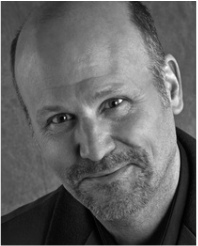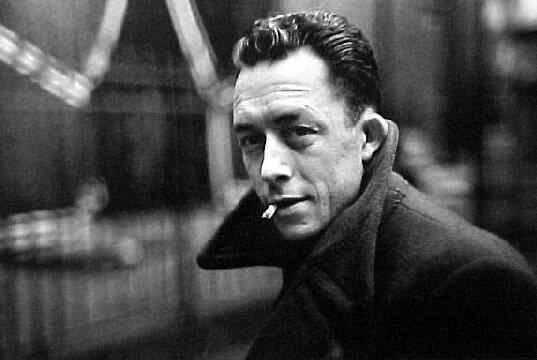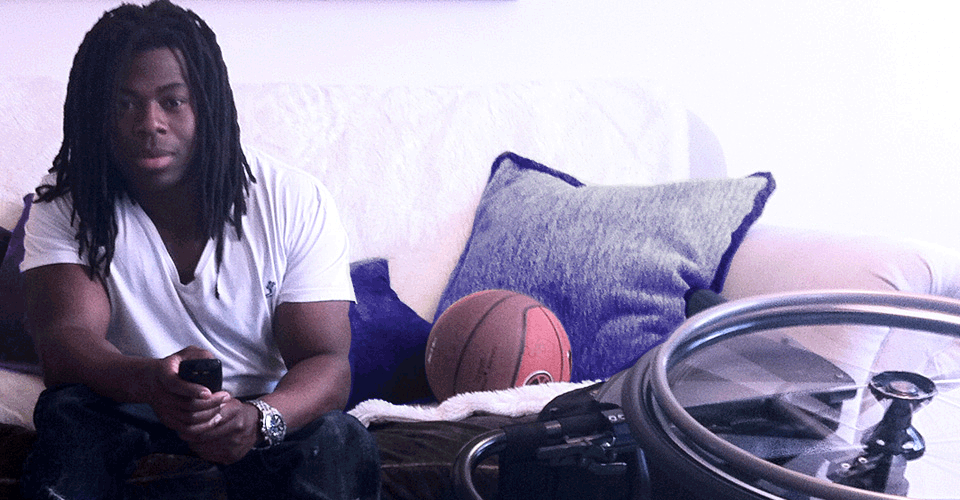The Apothetae presented "Downsizing Camus" at The Brooklyn Academy of Music (BAM) on Saturday, July 25th, 2015 as part of Cripfest to commemorate the twenty-fifth anniversary of the Americans With Disabilities Act. Previous to this event, "Downsizing Camus" had been developed at Victory Gardens in Chicago, Page To Stage at The Kennedy Center for the Performing Arts in Washington, D.C. and The Lark Play Development Center in New York City.
Amongst the bill of solo performers at the Cripfest, The Apothetae was the only group to present a fully-staged production that featured an integrated ensemble of disabled and non-disabled actors in a work by a living, disabled playwright.
I asked Todd about his process and his work with The Apothetae.
-Gregg Mozgala, Artistic Director
1. You are a blind playwright. One of the things that initially drew me to CAMUS was the fact that it contained no disabled characters and did not overtly deal with Disability. It is however packed with ideas. I have heard you say that the universal, existential themes of Alienation and Isolation that run through the play are how your experience as a blind playwright entered into the work. Can you talk a little more about that, as it relates specifically to, CAMUS, and your other work?
Sure. CAMUS, as you said, deals with the ideas of Existentialism, Modernism, and Post-Modernism. And I suppose I am drawn to those ideas because I am blind. Although I am fortunate to have a very loving relationship with my wife, family and incredible friends; being blind is isolating. I have not made eye contact with anyone in over twenty years, and can’t see the details of another person’s face unless I am literally nose-to-nose with them. So what I like about the ideas in the play as they relate to the isolating aspect of Disability, is that they make a case that none of us can transcend that. In other words: on a certain level we are all alone, and thus, equal.
2. As you know, The Apothetae's mission is to produce work that "explores and illuminates the Disabled Experience." We added several elements to the recent production at BAM that weren't in the original script (DJ character, Foley effects, audio description, the purgatorial/Sisyphisian elements, etc). Can you talk about what that was like for you as a writer, and how collaborating with The Apothetae to "blow out" your play in terms of theatricalizing visual impairment enhanced, changed, or detracted from the piece?
I loved this experience! In fact, as this is a very early play of mine, I had kind of moved on from it, and…let’s just say, would not have sought it out myself. But what The Apothetae did was amazing! They truly did blow it out and make it much more interesting and exciting. And to me, what I love about theater, is the collaborative effect. That Thursday night rehearsal where we collectively came up with the new ending by bouncing ideas off each other was just exhilarating! I’ve had novelist friends of mine come to my plays and they get nervous about the thought of “turning it over” to other people, whereas I get excited about it, precisely because of what happened with this play: it got a lot better by having talented, smart, dedicated people throw themselves into it. Also, I acknowledge, that as a visually impaired artist, I bring certain unique gifts, but I am also hindered in certain ways. The visual elements added to the play—as well as the editing down which only outside eyes can do—enhanced the play in ways that I could never have gotten to on my own. Finally, this was the first time I have ever worked with a theater artist who shares my same disability {Pamela Sabaugh, who played Meg, and Todd both have forms of macular degeneration} and I cannot begin to express what a profoundly significant experience that was. To quote a line from another play of mine “Belief is a statement; Truth, an experience.” A play written by a blind playwright, performed by a blind actress (as well as actors with other disabilities) holds great, great power for the blind community. It’s one thing for people to keep telling you, you can do it, and quite another to actually see people like you doing it.
3. This is your second production this year? Can you tell us a little bit about audiences response to your work-a) generally as a writer and b) as a writer who identifies as "Disabled" and writes on these themes?
The response to both this play and THE BIRD FEEDER DOESN’T KNOW which was produced at Raven Theatre in Chicago earlier this year have both been very positive—for the most part! I’d say the resistance, as well as the enthusiasm, stems from the fact that these stories—stories of disability—are not getting told enough. They scare some people—especially when it is made evident to them that these are universal stories; whereas others are thrilled as they have been starved to have their story told. Often after BIRD FEEDER, which is much more overtly about disability, I would have people come up to me and say “That is my family” or mention how they know someone who has gone through a similar thing. I witnessed a couple of people who could not get out of their seats for a period of time after the show ended they were so moved. Disability, both directly and indirectly is an experience we all share. It is also an experience which is not articulated enough, and certainly not by disabled writers, or performed by disabled actors. So in other words, we have a topic with a very large, very hungry audience, that is not getting fed often enough, so thy gorge on it whenever they get the chance!




 RSS Feed
RSS Feed